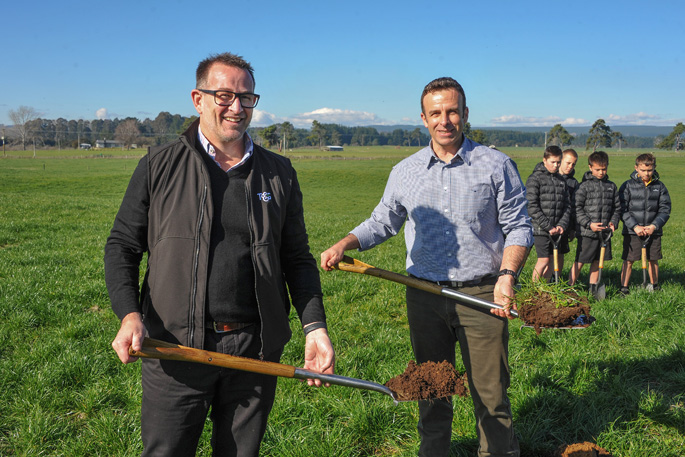Farmers and growers will become an important part of researching and refining the use of bio-fertiliser created in New Zealand’s first large-scale food waste-to-bioenergy facility being built at Reporoa.
Construction of the facility, which will turn 75,000 tonnes of organic waste from businesses and kerbside food scrap collections throughout the North Island into sustainable renewable clean energy, began recently.
The facility will also produce clean bio-fertiliser for about 2000ha of local farmland and provide CO2 and heat to enhance the growth of tomatoes in T&G Fresh’s local glasshouse, which are part of T&G Global.
The new anaerobic digestion facility is owned by Ecogas – a joint venture between Pioneer Energy Ltd and Ecostock Supplies Ltd – on land owned by T&G Fresh.
Co-funded by Ecogas and a 2019 $7 million loan from the Provincial Growth Fund, the $30 million state-of-the-art facility will provide an infrastructure boost to the local economy and generate close to 60 new jobs during its construction.
Ecogas director Andrew Fisher says that the facility will be an enclosed manufacturing site creating bio-gas and bio-fertiliser by recovering biomass/organic matter/food waste and feeding it at a consistent and managed rate.
“Part of the management is removal of all packaging and containers via two stainless steel 20-tonnes-per-hour processing lines, which also reduces all matter to less than 12mm, as it’s liquidised into a consistent ‘soup’ for feeding to the ‘bugs’ housed within the digestor tanks.
“The process also includes holding the ‘soup’ in a low ph state 2-4 (acidic) for three to five days, then it’s pasteurised at a minimum of 72 degrees centigrade for 60 minutes.
“The final bio-fertiliser passes through a 1mm screen, to give a consistent product suitable for application via different on-farm methods.”
Feedback and market experience
During the last nearly four years Ecogas has appreciated the support given to the project by the PGF, local iwi and Federated Farmers, so they are keen to acknowledge the support by engaging and working with farmers and growers to gain feedback and market experience in using bio-fertiliser – a product already proven globally, and delivering savings and productivity.
Currently Ecogas is working with a pool of existing local farmers who’ll look to use the clean bio-fertiliser. They will look to meet and work with others throughout the Central North Island, and have established a pilot plant in Wiri, Auckland, which will be producing bio-fertiliser from January 2021.
Ideally, Ecogas would like another 10-15 farmers, who could offer 100-200m2 on their farm to do some comparative growth trials throughout the next two years, says Andrew.
“In the UK more than 2000 large-scale farms use bio-fertiliser to reduce the percentage of synthetic nitrogen application and support carbon sequencing in the soil.”
Andrew estimates the new facility will also create enough energy to annually power up the equivalent of around 2500 households in the region. “The outcome is a carbon-neutral, circular economy solution. By revolutionising our reuse and recovery of this organic resource, each year the facility is expected to remove up to 10,000 tonnes of carbon dioxide – that’s the equivalent of planting 218,400 trees every year.
“It’s innovative solutions and real-world science such as this, which we believe NZ needs to increasingly pilot and adopt, that will help us as a nation meet our zero-carbon targets.”
Anaerobic digestion technology is well-proven overseas with similar plants operating in Europe and the US – however this joint venture will be the first commercial-scale facility in NZ.
Immense support
And the project has received immense support from every sector of the local community, says Andrew, “They’re making it happen, providing catering, contractors, tractors and showing that rural NZ is leading the sustainability push.”
As for construction, the first stage is the foundations and civils then building tanks and buildings during the next 12 months. “Following this is the installation of control panels and specialist equipment which then allows manufacturing to begin.
“The commissioning and testing of the facility, and all of its specialist elements, is a significant period which will include linking up with off-shore ‘sister sites’, so going forward our operations and management team can compare performance and output with similar facilities,” says Andrew.
“Benchmarking is an important aspect and we are striving for this facility to be part of a global community leading bio-technology and innovation, hopefully in future being able to host short and long-term exchanges with other facility operators in UK, Europe and Australia.”
And the Reporoa Ecogas facility may in time also look to produce other commercial products such as electricity, liquid dry ice from CO2, which is currently imported into NZ, and Bio-CNG (Compressed Natural Gas).
“With New Holland Tractors now producing a commercial bio-methane (CNG) tractor, this is very much an area we want to showcase in NZ. Using locally-manufactured fuel, from our biogas, to keep it local and demonstrate bio-technology in action in NZ.” The facility will be operational in 2022.



0 Comments
Leave a Comment